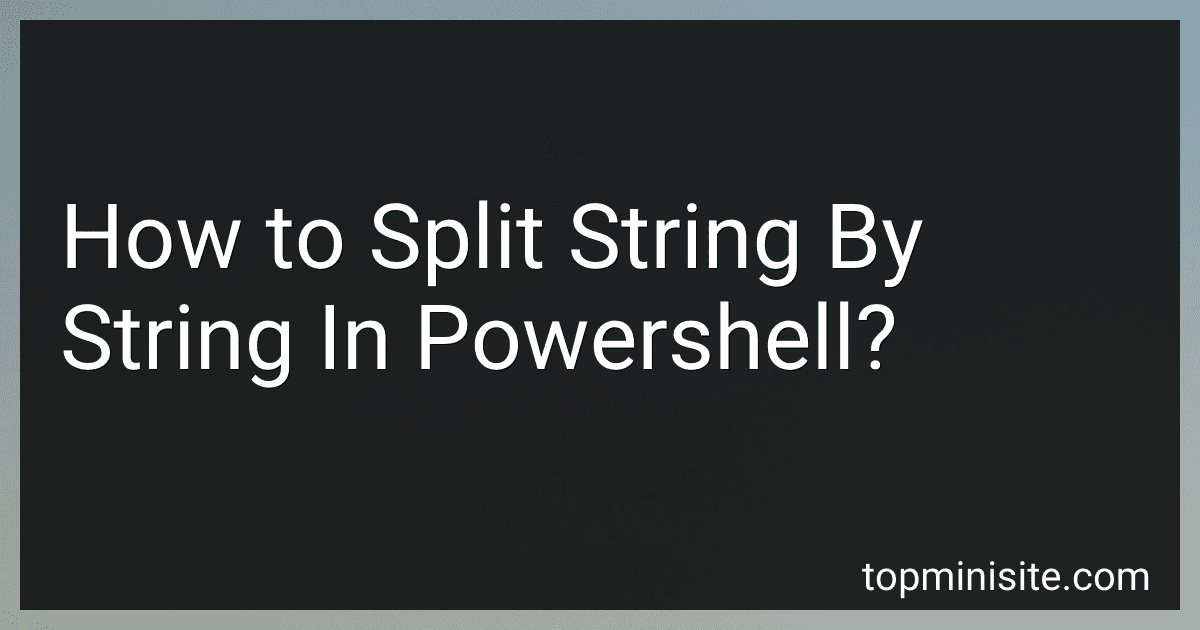Posts - Page 107 (page 107)
-
 6 min readTo convert a datetime to a string in PowerShell, you can use the built-in ToString() method on a DateTime object. This method allows you to specify a format string to customize the output. For example, you can use the following code: $now = Get-Date $stringDate = $now.ToString('yyyy-MM-dd HH:mm:ss') This will convert the current date and time to a string in the format yyyy-MM-dd HH:mm:ss.
6 min readTo convert a datetime to a string in PowerShell, you can use the built-in ToString() method on a DateTime object. This method allows you to specify a format string to customize the output. For example, you can use the following code: $now = Get-Date $stringDate = $now.ToString('yyyy-MM-dd HH:mm:ss') This will convert the current date and time to a string in the format yyyy-MM-dd HH:mm:ss.
-
 3 min readTo convert decimal numbers to time in Oracle SQL, you can use the following steps:First, multiply the decimal number by 24 to convert it to a 24-hour format.Next, extract the hour part by using the TRUNC function.Then, calculate the minute part by multiplying the remaining decimal part by 60 and extracting the integer value.Finally, concatenate the hour and minute parts together to get the time in HH:MM format.
3 min readTo convert decimal numbers to time in Oracle SQL, you can use the following steps:First, multiply the decimal number by 24 to convert it to a 24-hour format.Next, extract the hour part by using the TRUNC function.Then, calculate the minute part by multiplying the remaining decimal part by 60 and extracting the integer value.Finally, concatenate the hour and minute parts together to get the time in HH:MM format.
-
 3 min readTo import a certificate using PowerShell, you can use the Import-Certificate cmdlet. First, make sure you have the certificate file saved on your local machine. Then, open PowerShell and run the following command: Import-Certificate -FilePath C:\path\to\certificate.cer -CertStoreLocation "Cert:\LocalMachine\My" Replace "C:\path\to\certificate.cer" with the actual path to your certificate file. The CertStoreLocation parameter specifies where the certificate should be imported to.
3 min readTo import a certificate using PowerShell, you can use the Import-Certificate cmdlet. First, make sure you have the certificate file saved on your local machine. Then, open PowerShell and run the following command: Import-Certificate -FilePath C:\path\to\certificate.cer -CertStoreLocation "Cert:\LocalMachine\My" Replace "C:\path\to\certificate.cer" with the actual path to your certificate file. The CertStoreLocation parameter specifies where the certificate should be imported to.
-
 4 min readTo execute an Oracle procedure in JDBC, you need to follow these steps:Connect to the Oracle database using JDBC.Create a CallableStatement object by calling the prepareCall() method on the Connection object. Pass the SQL query that calls the procedure as an argument to the prepareCall() method.Set any input parameters for the procedure by calling the setXxx() methods on the CallableStatement object, where Xxx is the data type of the parameter.
4 min readTo execute an Oracle procedure in JDBC, you need to follow these steps:Connect to the Oracle database using JDBC.Create a CallableStatement object by calling the prepareCall() method on the Connection object. Pass the SQL query that calls the procedure as an argument to the prepareCall() method.Set any input parameters for the procedure by calling the setXxx() methods on the CallableStatement object, where Xxx is the data type of the parameter.
-
 5 min readTo create a TCP stream in Rust, you can use the standard library's TcpStream module. First, you need to import the necessary libraries by adding this line to your code: use std::net::TcpStream; Next, you can create a TCP stream by calling the connect() method on the TcpStream struct. This method takes a network address as a parameter, which can be an IP address and port number combination. Here's an example: let stream = TcpStream::connect("127.0.0.1:8080").
5 min readTo create a TCP stream in Rust, you can use the standard library's TcpStream module. First, you need to import the necessary libraries by adding this line to your code: use std::net::TcpStream; Next, you can create a TCP stream by calling the connect() method on the TcpStream struct. This method takes a network address as a parameter, which can be an IP address and port number combination. Here's an example: let stream = TcpStream::connect("127.0.0.1:8080").
-
 3 min readIn PowerShell, you can split a string by another string using the Split method or the -split operator.To split a string by a specific string using the Split method, you can use the following syntax: $string.Split('separator') To split a string by a specific string using the -split operator, you can use the following syntax: $string -split 'separator' Both methods will return an array of substrings that were separated by the specified separator string.
3 min readIn PowerShell, you can split a string by another string using the Split method or the -split operator.To split a string by a specific string using the Split method, you can use the following syntax: $string.Split('separator') To split a string by a specific string using the -split operator, you can use the following syntax: $string -split 'separator' Both methods will return an array of substrings that were separated by the specified separator string.
-
 3 min readTo run PowerShell in Command Prompt, you can simply type 'powershell' and press enter. This will open a new PowerShell window within the Command Prompt window. You can then start entering PowerShell commands as you normally would in a standalone PowerShell session. To return to the Command Prompt, simply type 'exit' and press enter.[rating:69124b1f-7719-4c02-b18b-990e9c9271ea]How to get help for a PowerShell cmdlet in CMD.
3 min readTo run PowerShell in Command Prompt, you can simply type 'powershell' and press enter. This will open a new PowerShell window within the Command Prompt window. You can then start entering PowerShell commands as you normally would in a standalone PowerShell session. To return to the Command Prompt, simply type 'exit' and press enter.[rating:69124b1f-7719-4c02-b18b-990e9c9271ea]How to get help for a PowerShell cmdlet in CMD.
-
 4 min readTo concatenate rows separated by a space in Oracle, you can use the LISTAGG function. This function allows you to concatenate values from multiple rows into a single string. Here is an example of how to use the LISTAGG function to concatenate rows separated by a space:SELECT LISTAGG(column_name, ' ') WITHIN GROUP (ORDER BY column_name) AS concatenated_rows FROM table_name;This query will concatenate the values from the specified column in the table, separated by a space.
4 min readTo concatenate rows separated by a space in Oracle, you can use the LISTAGG function. This function allows you to concatenate values from multiple rows into a single string. Here is an example of how to use the LISTAGG function to concatenate rows separated by a space:SELECT LISTAGG(column_name, ' ') WITHIN GROUP (ORDER BY column_name) AS concatenated_rows FROM table_name;This query will concatenate the values from the specified column in the table, separated by a space.
-
 5 min readTo get the timestamp with timezone in Rust, you can use the chrono library which provides functionalities for working with dates and times. You can use the Utc timestamp to get the current timestamp in Coordinated Universal Time (UTC) and then convert it to the desired timezone using the chrono::DateTime::with_timezone() method. You can also specify the timezone by using the chrono::FixedOffset struct.
5 min readTo get the timestamp with timezone in Rust, you can use the chrono library which provides functionalities for working with dates and times. You can use the Utc timestamp to get the current timestamp in Coordinated Universal Time (UTC) and then convert it to the desired timezone using the chrono::DateTime::with_timezone() method. You can also specify the timezone by using the chrono::FixedOffset struct.
-
 3 min readTo check if a file is older than a certain time with PowerShell, you can use the Get-Item cmdlet to retrieve information about the file and then compare the LastWriteTime or CreationTime property of the file to the current date and time. You can also use the New-TimeSpan cmdlet to calculate the difference between the current date and time and the LastWriteTime or CreationTime of the file to determine how old the file is.
3 min readTo check if a file is older than a certain time with PowerShell, you can use the Get-Item cmdlet to retrieve information about the file and then compare the LastWriteTime or CreationTime property of the file to the current date and time. You can also use the New-TimeSpan cmdlet to calculate the difference between the current date and time and the LastWriteTime or CreationTime of the file to determine how old the file is.
-
 3 min readTo extract the month number from a date in Oracle, you can use the EXTRACT function along with the MONTH keyword. For example, you can use the following SQL query to extract the month number from a date field:SELECT EXTRACT(MONTH FROM your_date_column) AS month_number FROM your_table_name;This query will return the month number from the specified date column in your table.
3 min readTo extract the month number from a date in Oracle, you can use the EXTRACT function along with the MONTH keyword. For example, you can use the following SQL query to extract the month number from a date field:SELECT EXTRACT(MONTH FROM your_date_column) AS month_number FROM your_table_name;This query will return the month number from the specified date column in your table.
-
 4 min readTo preload lazy_static variables in Rust, you can use the lazy_static! macro along with a function to initialize the variable. This allows you to set up the variable with a specific value or state before it is accessed for the first time. By using lazy_static, you can ensure that the variable is only initialized once and then reused throughout the lifetime of the program.
4 min readTo preload lazy_static variables in Rust, you can use the lazy_static! macro along with a function to initialize the variable. This allows you to set up the variable with a specific value or state before it is accessed for the first time. By using lazy_static, you can ensure that the variable is only initialized once and then reused throughout the lifetime of the program.